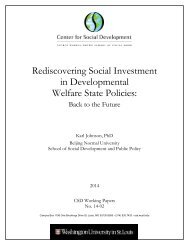Exploring and Assessing Intercultural Competence - Center for ...
Exploring and Assessing Intercultural Competence - Center for ...
Exploring and Assessing Intercultural Competence - Center for ...
You also want an ePaper? Increase the reach of your titles
YUMPU automatically turns print PDFs into web optimized ePapers that Google loves.
- appreciate differences (2)<br />
- suspending judgment<br />
- adaptability (3)<br />
- curiosity (1)<br />
- open-minded (1)<br />
- motivated (1)<br />
- self-reliant<br />
- empathy (1)<br />
- clear sense of self<br />
- perceptive<br />
- tolerance of ambiguity<br />
They also cited several additional qualities they considered important:<br />
- respect (1)<br />
- reflective (1)<br />
- problem solving (1)<br />
- host language / communication (4)<br />
- attitude (1)<br />
- creativity (1)<br />
- relationships (2)<br />
- knowledge of local culture (1)<br />
Summary<br />
<strong>Exploring</strong> <strong>and</strong> <strong>Assessing</strong> <strong>Intercultural</strong> <strong>Competence</strong><br />
By completing all items in Part II of the survey <strong>for</strong>m <strong>and</strong> leaving no item blank, mentors<br />
acknowledged all 15 attributes. In open-ended interviews, they spontaneously confirmed 7 of<br />
them without prompts <strong>and</strong> they identified 8 additional qualities not on the original list. Among<br />
this last group, all 4 cited host language / communication as important to IC success.<br />
Assertion No. 2: Learning the host language affects ICC development<br />
(About learning the host language)<br />
Discussion<br />
Spontaneous comments made by mentors concerning the role of language <strong>and</strong> communication<br />
were:<br />
(FEMS1+I)<br />
- “It is important that volunteers learn Spanish since it makes them more self-confident <strong>and</strong> helps<br />
them communicate in a better way. Working in this environment allows them to learn the<br />
language on a deeper level. For mentors, it is very important that the volunteers learn Spanish<br />
because with this knowledge they can exchange ideas with each other <strong>and</strong> this makes their<br />
experience richer.”<br />
(FEMS3+I)<br />
- “Volunteers tend to communicate in many different ways when they aren’t able to express<br />
something. When it comes to the working with kids, (language) is fundamental since kids tend to<br />
be very curious <strong>and</strong> volunteers have to find a way to communicate with them.”<br />
<strong>Center</strong> <strong>for</strong> Social Development<br />
Washington University in St. Louis<br />
55
















